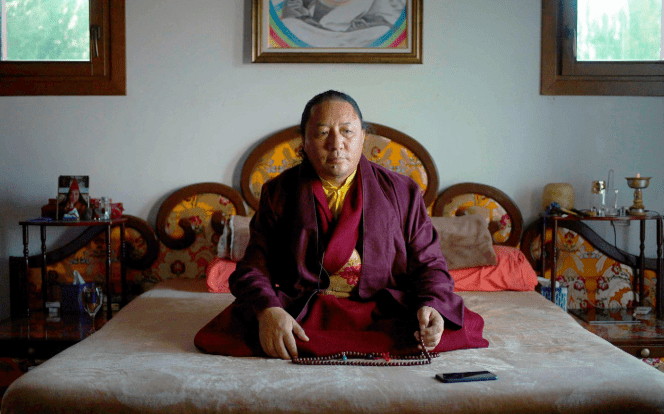ARTE – TUESDAY SEPTEMBER 13 AT 10.35 P.M. – DOCUMENTARY
From assaulted nuns to conversion therapy, documentaries have been playing a warning role lately, bringing to the public the moral and sexual crimes of closed religious institutions. These excesses are not the prerogative of the Catholic Church alone: the case of Tibetan Buddhism is eloquent.
Buddhism, the law of silence opens with the case of a man who was raised in a secluded community with the Belgian lama Robert Spatz. Ricardo Mendes is the spokesperson for twenty-three civil parties who were victims of this pioneer in the importation of Tibetan Buddhism into Europe. The testimonies during this 2021 trial (without the accused, who lives in Spain) for the exploitation of workers, the taking of children hostage and sexual abuse, are edifying: cut off from the world, these children recount the beatings, the deprivations food and rape.
Ricardo Mendes’ legal battle is the red thread of the documentary which, after an opening on these strong testimonies, struggles to keep this tempo. Multiplying the protagonists, the film dwells at length on the unique situation of this religion represented by the Dalai Lama, who lives in exile in Dharamsala, India.
Inducted in 1950, Tenzin Gyatso, the fourteenth to bear the name, is not only a spiritual leader, he is also a political leader with prosaic objectives – to obtain international support on the Tibet question vis-à-vis China and funds to finance his institutions. Deciphered by the film, these issues offer a reverse look at the disinterested image conveyed by this religion and the iconic figure of the Dalai Lama, worn by the 1989 Nobel Peace Prize.
An unknown ecosystem
His wait-and-see attitude to the abuses committed in these communities is particularly well supported. He knew and did (almost) nothing, possibly deterred by the large funds that European Buddhist entities assure him, according to a hypothesis that emerges in the documentary. In the case of the OKC community of Robert Spatz, this accusation is also made against the Buddhist monk Matthieu Ricard. Like the spiritual leader, the latter would have been aware of the abuses committed by the Belgian lama without ever intervening. We regret that his lawyer canceled the broadcasting of extracts from the two-hour interview initially recorded: apart from the testimony of an incriminated lama, the “official” word is missing – the interested parties having declined.
By unveiling this little-known ecosystem, the film directed by Elodie Emery and Wandrille Lanos – co-authors of an eponymous book (JC Lattès, 216 pages, 18 euros) – drives a troubling wedge into the very smooth reputation enjoyed by Buddhism in the West. . But the dead times and the repetitions signal the lack of density of a documentary which would have found its tempo better with a format of fifty-two minutes.
He thus returns without bringing any novelties to the case – certainly revolting but documented for a long time – of the lama Sogyal Rinpoche (1947-2019). The empire founded in the 1990s by the best-selling author The Tibetan Book of Life and Death (The Round Table, 1993) flourished, until his public recusal by the Dalai Lama in August 2017 in response to accusations of abuse. A gallery of striking testimonies, this story finally calls for a larger-scale investigation to continue to clarify the vagueness.
Buddhism, the law of silence, by Elodie Emery and Wandrille Lanos (Fr., 2022, 90 min). On Arte.tv until November 11.
Matthieu Ricard’s reaction
The Buddhist monk Matthieu Ricard published, Friday, September 9, in the morning, a press release on his blog in reaction to the release of the documentary Buddhism: the law of silence. “The ambition of this documentary is salutary, because freeing the voice of the victims is difficult”, recognizes the Frenchman, who embraced the Tibetan tradition questioned in the film several decades ago. “The extent of the abuse denounced and the suffering of the often very young victims is terrifying. This is all the more revolting as they were inflicted by men claiming a religion and a philosophy based on wisdom, compassion and the eradication of suffering. develops Matthieu Ricard.
On the other hand, he is very critical of the ethics of directors towards him. “My condemnation of the acts of Robert Spatz, Sogyal Rinpoche and false masters is total. […] This does not prevent them from presenting me as an accomplice of this “law of silence””, he regrets, before returning to the reasons which led him to request the withdrawal of the interview which was to be broadcast in the documentary.
“A filmed interview was carried out by one of the journalists of the documentary. To obtain it, the latter explained to me that he was preparing a film on the history of Buddhism,” explains Matthieu Ricard. And to continue: “When, in the middle of the interview, suddenly changing the subject, the journalist threw false accusations at me around Robert Spatz, I understood that the film project sent was a fake. [….] Having devoted my life to the study and preservation of Tibetan Buddhism, I could not participate in this documentary nor trust a journalist who had used deception against me. »

